
Romania's Abandoned Children: Deprivation, Brain Development, and the Struggle for Recovery PDF
Preview Romania's Abandoned Children: Deprivation, Brain Development, and the Struggle for Recovery
ROMANIA’S ABANDONED CHILDREN ROMANIA’S ABANDONED CHILDREN Depr iv at ion, Brain Development, and the Struggle for Recovery Charles A. Nelson Nathan A. Fox Charles H. Zeanah HArvArd UNiversity Press Cambridge, Massachusetts, and London, Engl and 2014 Copyright © 2014 by the President and Fellows of Harvard College All rights reserved Printed in the United States of America Library of Congress Cataloging-i n-P ublication Data Nelson, Charles A. (Charles Alexander) Romania’s abandoned children : dep riv at ion, brain development, and the struggle for recovery / Charles A. Nelson, Nathan A. Fox, Charles H. Zeanah. pages cm Includes bibliographical references and index. ISBN 978-0 -6 74-7 2470-9 (alk. paper) 1. Abandoned children-- R omania-- P sychology. 2. Abandoned children-- Deinstitutionalization-- R omania. 3. Depr iv at ion (Psychology). I. Fox, Nathan A. II. Zeanah, Charles H. III. Title. HV887.R6N45 2014 362.7309498-- dc23 2013017625 To Gwen and Colin; to Betsy, Rebecca, and David; and to Paula, Emily, Katy, and Melanie . . . for everything Contents Preface ix 1. The Beginning of a Journey 1 2. Study Design and Launch 19 3. The Hist ory of Child Institutionalization in Romania 39 4. Ethical Considerations 70 5. Foster Care Intervention 94 6. Developmental Hazards of Institutionalization 124 7. Cognition and Language 154 8. Early Institutionalization and Brain Development 182 9. Growth, Motor, and Cellular Find ings 211 10. Socioemotional Development 227 11. Psychopathology 266 12. Putt ing the Pieces Together 300 References 335 Notes 369 Acknowledgments 383 Index 391 Preface This book is the culmination of more than a dec ade of research on currently and previously institutionalized children, along with chil- dren from the community who were never institutionalized. Al- though the story takes place in Romania, the implications for chil- dren around the world are considerable. UNICEF estimates that as many as 70 to 100 million children worldwide are orphans, with 8 million living in institutions. (UNICEF de fnes an orphan as a child who has lost at least one parent.) The estimated num- ber of children living in institutions is surely low, given that many poor countries relying on institutional care do not keep reliable reco rds. This number will most likely grow in coming years, for two rea- sons. First, wars and illnesses like AIDS will leave more children without parents. Second, the number of children being adopted internationally, at least by U.S. families, has dropped considerably (from a high of about 20,000 in the early 2000s to approximately 12,000 in 2010 to about 10,000 in 2012). In the face of such a large and complex public health challenge, the U.S. government has been exploring ways to implement evidenced-b ased strategies among children living outside of family care. Und ers tand ing what happens to children who experience pro- found early dep riv a tion is essential: it will improve our sci ent ifc und ers tandi ng of the role of experience in brain development, and it will guide governments on how best to care for parentless chil- ix
